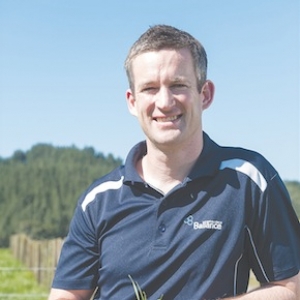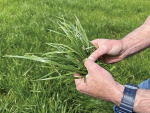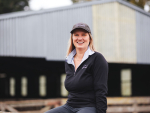Ballance science manager, Aaron Stafford, says getting the best grass for the least cost can be achieved with a hand from science.
The “grow your own” approach of using nitrogen fertiliser to boost pasture growth provides the most cost-effective supplementary feed, but with cash-strapped farmers working within very tight budgets, they want to be confident of a good pasture response to money spent on nitrogen.
“There is nothing more frustrating than seeing a poor or variable pasture response nitrogen fertiliser to boost feed availability, says Stafford.
“We can help farmers get the best results by enabling them to tailor application rates to areas which are likely to produce the highest pasture response.”
Application rates can be tailored using Ballance’s N-Guru, a software tool developed with AgResearch through Ballance Agri-Nutrients Clearview Innovations Primary Growth Partnership programme. Based on a soil ‘total N’ test that has been calibrated with pasture nitrogen response, N-Guru can help to improve efficiency of nitrogen fertiliser use, by linking data from the farm with a nitrogen response database. This allows N-Guru to forecast which parts of the farm are likely to be more responsive to nitrogen fertiliser. It is most valuable when soil testing shows variation in total nitrogen levels across a property, although it can also be useful to look at the seasonality of nitrogen responses. Five years’ worth of research across sites throughout New Zealand has shown good results.
Stafford says the tool is best used strategically to guide how to allocate the nitrogen budget for a season. For example, across a year a dairy farm could apply 100 kg N/ha uniformly across the entire farm.
“With that amount of nitrogen applied across a season, you might expect to achieve an average 10:1 response and an extra 1000 kg of dry matter per hectare. Depending on the soil test variability, N-Guru could tell us that in low soil nitrogen areas, the typical nitrogen response will be higher (e.g. 13 kg of DM per kg of N applied), whereas in high soil nitrogen areas the nitrogen response could be down to 7 kg of DM per kg of N applied. Where we can help is to ensure the investment in fertiliser delivers the best response rate by putting the nitrogen where it will make the most difference.”
Allocating more of the season’s nitrogen to the low testing areas and less to the high testing areas would make sense to improve nitrogen response efficiency and return on your fertiliser investment. N-Guru can assist with determining what the likely benefit would be from varying nitrogen inputs.


















